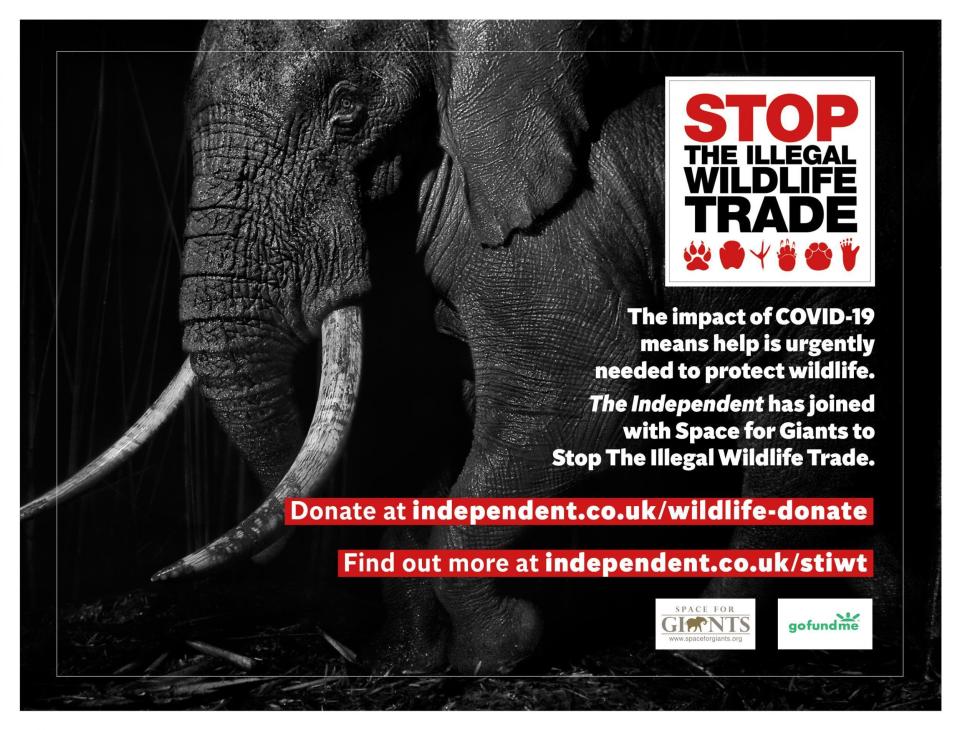Conservationists demand closer scrutiny of global ‘legal’ wildlife trade

Wildlife conservation groups are demanding closer scrutiny of the global wildlife trade after The Independent revealed last week that chimpanzees are being illegally shipped out of Africa to foreign zoos under the guise of legal exports.
There are an estimated 200,000 chimps left in the wild, with numbers projected to decline by 80 per cent in the next 30 years due to habitat loss, disease, and poaching. The threats are compounded by the primates’ slow reproduction rate.
Illegal trafficking also poses a significant danger. While some 3,000 chimpanzees, gorillas, bonobos and orangutans are killed or snatched from the forest each year, the UN Environment Programme says, wildlife organisations also point to the blurred lines of the legal trade, and the seemingly lax oversight of governments, as having an impact on dwindling numbers.
Ben Williamson, programs director of World Animal Protection US, told The Independent that legal trade in wild animals, under the multilateral Convention on International Trade in Endangered Species (CITES) treaty, provides cover for illegal trade.
“Every day, thousands of wild animals are poached from the wild and sold into the global multi-billion-dollar legal commercial trade,” he said.
“It’s as simple as mislabeling or paying off a customs official to look the other way to flout CITES rules and contribute to the demise of populations.”
In May, an investigation by South African conservation groups, Ban Animal Trading (BAT) and EMS Foundation, found that thousands of endangered animals, including chimps, are being illicitly traded from the country to China.
The report claimed that it was a “myth that the legal trade somehow crowds out the illegal trade, or that because it is legal, the animals involved are somehow treated well”.

It added: "To the contrary, the legal and illegal trade are so intertwined as to be functionally inseparable.
“South Africa’s live wild animal trade with China is riddled with irregularities that are exploited by traffickers. There are gaping loopholes in the global permitting, enforcement and oversight system."
Pan African Sanctuary Alliance (PASA) works to save endangered primates and is the largest association of wildlife centers in Africa. Executive director, Gregg Tully, told The Independent that because enforcement of CITES regulations is left to each country, it leaves a lot of potential for blurring the line between legal and illegal trade.
"A CITES official might decide that sending wildlife to a zoo in another country is non-commercial trade, even if the animals are sold for large enough amounts of money to drive people to poach animals from the wild to meet the demand,” Mr Tully said.
The Independent’s Stop the Illegal Wildlife Trade campaign, which was launched earlier this year, seeks an international effort to clamp down on poaching and the illegal trade of wild animals.

A 2018 study found that the average value of the international market for live infants and juvenile chimps may be up to $8.8million each year. And it is far from only chimps that are at risk.
World Animal Protection’s 2019 investigation into the international shipping of African Grey Parrots revealed the illegal trafficking of birds under cover of the legal trade, a practice that has caused a sharp decline in their wild populations.
"Wildlife trade, whether legal or illegal, is one of the major contributors to declines in species, biodiversity, and human and animal health,” said Audrey Delsink, the South Africa- based wildlife director for Humane Society International.
"The consequences for individual animals who survive trafficking and are caught in the dark web of the trade, are tragic. Despite the world being brought to its knees by Covid-19, the cruel and risky trade in wildlife continues."
Katto Wambua is senior criminal justice advisor at international conservation charity, Space for Giants, and trains investigators, prosecutors and magistrates in six African countries to make judicial action against suspected wildlife criminals more effective.
“Violations of legal processes should be a focus of national authorities in Africa as part of their broader judicial strategies,” Mr Wambua said.
“That means painstaking work building systemic capacity. That is as important as equipping rangers in the bush to stop the illegal wildlife trade, but it’s far less often the focus and is chronically underfunded.”
Read more
'The legal and illegal trade are inseparable': The drain of Africa’s chimpanzees for foreign zoos
Stop The Illegal Wildlife Trade: Beauty brand Chantecaille’s fight to save rhinos from poachers

 Yahoo News
Yahoo News 
